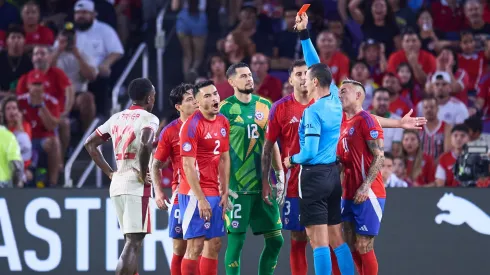A nail-biting 0-0 draw with 10-man Chile, saw the Canadian national soccer team achieve a historic feat, advancing to the quarterfinals of the Copa America for the first time.
Played on a dreary Saturday night in Orlando, this match was monumental for more than just the outcome; it also represented a turning point for Canadian soccer in the global arena.
Canada entered the match needing a draw to progress to the knockout stages. The result moved them up to four points in Group A, finishing behind Argentina, who topped the group with nine points after defeating all three of their opponents, including a 2-0 win over Peru.
Chile, a two-time Copa America champion, ended their campaign with only two points, marking the first time they exited at the group stage since 2004.
Chile’s uphill task of winning the match was made even harder when Gabriel Suazo received a second yellow card in the 27th minute for a foul on Richie Laryea, reducing Chile to 10 men. Despite this advantage, the Reds struggled to break through Chile’s defense.
The match had few clear scoring opportunities, with Chilean goalkeeper Gabriel Arias making crucial saves against Canada’s Stephen Eustaquio and Tajon Buchanan. Meanwhile, Canadian goalkeeper Maxime Crepeau denied a deflected effort from Alexis Sanchez, keeping the game goalless.
In the second minute of stoppage time, Canada thought they had scored through substitute Tani Oluwaseyi, but the goal was correctly ruled out for offside.
The final whistle confirmed Canada’s place in the quarter-finals, a milestone for the team and their supporters.

Canada have advanced from a tough group.
Challenges and criticism
Despite their historic progression, Canada’s performance was not without its challenges. Canada’s captain, Alphonso Davies, acknowledged the difficulties faced during the group stage. “We knew coming into these games that it was not going to be easy,” he told OneSoccer. “We have to fight and we have to battle. And we have to do whatever we can to survive. And yeah, at times obviously we suffered. But we suffered together. And we got through it together.”
Chile’s exit was marked by frustration and criticism of the refereeing. Alexis Sanchez voiced his discontent, suggesting that poor officiating had impacted the game. “CONMEBOL has to be a little more efficient and learn from what Europe is like. It is no excuse, but refereeing like that makes you angry. A red card ruins the whole game,” he said. Additionally, Chile felt aggrieved by a non-reviewed incident involving Canada’s Moise Bombito and Rodrigo Echeverria, which further fueled their discontent.
What can Canada improve for next stage?
The match itself was a tactical battle. Chile started stronger, creating more opportunities, with Victor Davila coming close with a volley in the 21st minute. However, the red card to Suazo shifted the balance in Canada’s favor. Jonathan David had a collision with Arias in the 38th minute, which led to an unsuccessful penalty appeal. Arias made another crucial save shortly before halftime, denying Eustaquio.
In the second half, Ricardo Gareca’s men continued to press but failed to seriously challenge Crepeau. The tropical conditions took a toll on the players, and as the game wore on, Canada’s numerical advantage became more apparent. Despite their efforts, Canada struggled to create clear scoring chances, highlighting the need for improvement in their attacking play.
As Canada prepares for the quarter-finals, likely against Group B winners Venezuela, they must address their attacking shortcomings. Canada scored only one goal in the group stage, courtesy of Jonathan David against Peru. Marsch and his team must find ways to increase their scoring efficiency if they hope to progress further in the tournament.
Photo credit: IMAGO / Photosport














